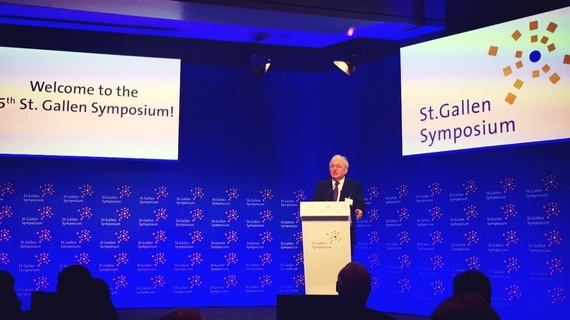Lord Griffiths of Forestfach, the former adviser to Baroness Margaret Thatcher and Vice-Chairman of Goldman Sachs International, sent a reverberating message amongst the audience of the 45th St. Gallen Symposium in Switzerland, "Be prepared to listen and be open to new ideas." This year's Symposium topic was "Proudly Small", and hosted more than 800 leaders who spent two intense days engaging in debates and discussing the state of world affairs.
Last year's rousing keynote by Prof. Niall Ferguson on networks and hierarchies was the perfect preface to this year's conference. "The key to understanding the world today," he began, "is between understanding your networks and my hierarchies." The discussion revolved around two paradigms: the older generations who sought to empower hierarchies, and the younger generations that refuse to be a part of such an old-fashioned system but rather prefer to create their own networks.
Bruno Frey, Senior Professor of Economics at Zeppelin University Friedrichshafen and advocated for a borderless society, made another convincing point with his stance, "Smallness is the basis of our society." His argument was that the masses focus too much on the big, when the solution often lies in retaining the essence of the small. The CEO of Swatch Group, Nick Hayek, believed that the power of small meant avoiding centralization within organizations and staying entrepreneurial, "An entrepreneurial spirit means you see opportunities and push them without guarantee of success."
Paul Kagame, the President of Rwanda, was an example of how under his leadership his country was able to turn trial into triumph for his country, and Tharman Shanmugaratnam, the Deputy Prime Minister and Finance Minister of Singapore, showed how Singapore transformed itself into a 1st world power. Both are representatives of two small countries that are now punching above their weight. Others supported the case indirectly by suggesting why it was so difficult for big entities to innovate. For example, Stephen Lee, Chairman of Singapore Airlines, explained that frictional forces between different departments lessen the freedom to move. As the captain of an airline, he is left to manage ideas in more constructive ways.
In other aspects, a curiosity was still abound on how the current generation of leaders were planning to structure the world so as to keep up with the changes that millennials demand. Paul Polman, CEO of Unilever, explained that our global system wasn't designed for the world we live in today. I asked a group of panelists discussing small states in transition on how they could change the system from the inside; their response was that change is difficult. It wasn't a satisfying answer, and I kept wondering how the power of small could lead to an updated system of global governance.
Big is not always the answer. Everything big today started out small at one point in the past. However, in a world of global institutions and companies, we can easily overlook such a fact. Often times, being small triumphs over big. Bigger institutions can stay nimble by embracing the small. In geopolitical terms that means globalization does not have to equal standardization. In that regard I would not be surprised if the number of countries that are recognized by the United Nations--which currently stands at 193--increases in the future. In the battle between hierarchies and networks, smallness is the key to rejuvenate hierarchies and create more networks.
Theodora Karamanlis contributed editing to this piece.

